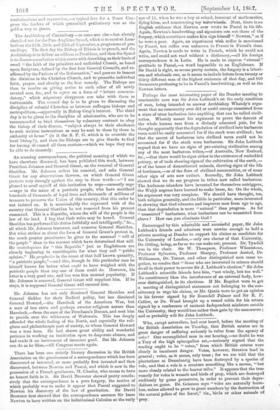There has been one strictly literary discussion in the British
Association on the genuineness of a correspondence which has been discovered or invented, or more probably first invented and then discovered, between Newton and Pascal, and which is now in the possession of a French gentleman, M. Chasles, who seems to have an honest faith in it. Sir David Brewster showed pretty conclu- sively that the correspondence is a pure forgery, the motive of which probably was to make it appear that Pascal suggested to Newton his discovery of the law of gravitation. Sir David Brewster first showed that the correspondence assumes Sir Isaac Newton to have written on the infinitesimal Calculus at the early
age of 11, when he was a boy at school, innocent of mathematics, flyingkites, and constructing toy 'waterwheels. Next, there is no English evidence that Newton ever wrote to Pascal in his life. Again, Newton's handwriting and signature are not those of the forgery, which sometimes makes him sign himself " Newton," as if he were a peer. Again, an experiment with eoffee is mentioned by Pascal, but coffee was unknown in France in Pascal's time. Again, Newton is made to write in French, which he could not write, and could not read without a dictionary,—all his foreign correspondence is in Latin. He is made to express " eternal " gratitude to Pascal,—a word impossible to an Englishman. If Sir David is right, as seems pretty certain, the forgery is a labori- ous and wholesale one, as it seems to include letters from twenty or thirty different men of the highest eminence of that day, and 800 documents professing to be in Pascal's handwriting, as well as the Newton letters.






























 Previous page
Previous page